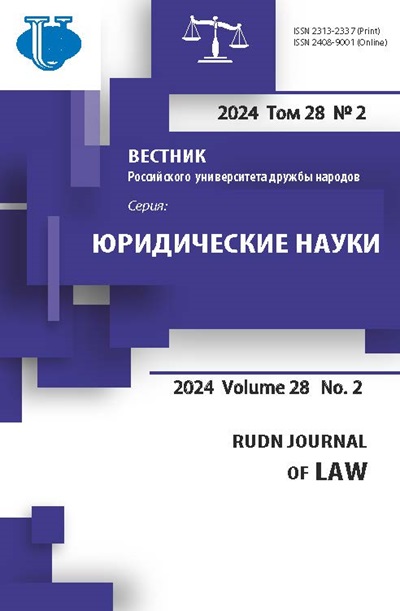Constitutional legal understanding: historical, theoretical and sectoral aspects
- Authors: Romashova M.R.1, Panchenko V.Y.2,3,4,5,6
-
Affiliations:
- Northwestern Institute of Management (RANEPA branch)
- All-Russian State University of Justice
- Siberian Federal University
- Moscow State Linguistic University
- Moscow University named after A.S. Griboyedov
- Research Institute of the Federal Penitentiary Service of Russia
- Issue: Vol 28, No 2 (2024)
- Pages: 378-389
- Section: HISTORICAL AND LEGAL RESEARC
- URL: https://journals.rudn.ru/law/article/view/39496
- DOI: https://doi.org/10.22363/2313-2337-2024-28-2-378-389
- EDN: https://elibrary.ru/JWKALB
- ID: 39496
Cite item
Full Text
Abstract
In the context of the constitutional law of Russia, the problem of interpreting the Constitution has traditionally been reduced to different views on it as a written document with a special political and legal status. In different periods of Russian history, the Constitution was perceived differently, which was reflected in different understandings of the relationship between the Constitution and the state, the Constitution and legislation, the constitution and human rights. One of the important aspects for the interpretation of the constitution was the interaction between the Constitution and constitutionalism, as well as state and constitutional law. Within the framework of this problem, the object is the phenomenon of constitutional legal understanding, considered as a theoretical and praxiological construction that combines scientific views and empirical ideas reflecting the formal and substantive features of the Constitution and constitutional law at different stages of the development of the legal system of Russia. The article explores the problem of legal understanding and law understanding in the domestic legal tradition, the understanding of the Constitution in the context of cyclical politogenesis, as well as the problem of constitutional law understanding in the context of the concept of a «living» Constitution.
About the authors
Maria R. Romashova
Northwestern Institute of Management (RANEPA branch)
Author for correspondence.
Email: 7029807@mail.ru
ORCID iD: 0009-0003-0504-5822
SPIN-code: 7179-0556
Teacher-methodologist of the Department of Constitutional and Administrative Law of the North-West Institute of Management, RANEPA branch
57/43 Sredny ave. V.O., Saint Petersburg, 199178, Russian FederationVladislav Yu. Panchenko
All-Russian State University of Justice; Siberian Federal University; Moscow State Linguistic University; Moscow University named after A.S. Griboyedov; Research Institute of the Federal Penitentiary Service of Russia
Email: panchenkovlad@mail.ru
ORCID iD: 0000-0003-3303-2941
SPIN-code: 5096-0428
Doctor of Legal Sciences, head of the Department of Theory, History of State and Law of All-Russian State University of Justice; Chief Researcher of the Siberian Federal University; Professor of the Department of General Theoretical Legal Disciplines of Moscow State Linguistic University; Chief Researcher of Moscow University named after A.S. Griboyedov; Chief Researcher of the Research Institute of the Federal Penitentiary Service of Russia
2/1 Azovskaya str., Moscow, 117638, Russian Federation; 79 Svobodny ave., Krasnoyarsk, 660041, Russian Federation; 38/1 Ostozhenka str., Moscow, 119034, Russian Federation;35/1 Novaya Basmannaya str., Moscow, 105066, Russian Federation; 15a/1 Narvskaya str., Moscow, 125130, Russian FederationReferences
- Antonov, M.V. (2013) Eugen Ehrlich: living law versus legal pluralism? Pravovedenie. 1(306), 157-181. (in Russian).
- Berlyavskij, L.G. (2014) Theoretical origins of the concept of a “living constitution” in the USA. State Power and Local Self-government. (11), 61-64. (in Russian).
- Bondar, N.S. (2013) At the root of the doctrine of “live” (real) national constitutionalism. Saratov State Law Academy Bulletin. 4(93), 42-47. (in Russian).
- Ilyin, V.N. (2018) Triad of S.S. Uvarov «Orthodoxy - Autocracy - Narodnost». Altaiskii vestnik gosudarstvennoi i munitsipal'noi sluzhby. (16), 33-35. (in Russian).
- Kartashov, A.K. & Akopov, V.S. (2005) Who is the owner of the Russian land? Journal of Russian Entrepreneurship. 6(4), 8-12. (in Russian).
- Kuliev, D.T. (2020) Sharia and Fiqh: Concept, Sources and Relation. Islamovedenie. 11(1), 13-25. https://doi.org/10.21779/2077-8155-2020-11-1-13-25. (in Russian).
- Lazareva, V.A. (2010) On the question of the correlation of the act of official normative interpretation and the normative legal act. Legal Science and Law Enforcement Practice. 2(12), 95-104. (in Russian).
- Minakov, P.A. (2015) Magna Carta: Modern legal interpretation. The Rule of Law State: Theory and Practice. 3(41), 149-154. (in Russian).
- Romashov, R.A. (2016) The Constitution of the RSFSR of 1918 and its place in the system of sources of Soviet constitutionalism. History of State and Law. (22), 14-21. (in Russian).
- Romashov, R.A. (2020) Politogenesis: TemplePolisState-State. Saint Petersburg, Aleteiya Publ. (in Russian). (in Russian).
- Romashov, R.A. (eds.). (2021a) Legal genesis: Tradition, will, law. Batova, O.S., Bryleva, E.A. & Vetyutnev, Yu.Yu. et al. Saint Petersburg, Aleteiya Publ. (in Russian).
- Romashov, R.A. (2021b) Importance in the context of cyclical politogenesis. Current problems of state and law in the comparative legal aspect: collection of scientific articles. Vitebsk, VSU named after P.M. Masherov, pp. 16-23. (in Russian).
- Salikov, M.S., Libanova, S.E. & Ostapovich, I.Yu. (2019) Constitutional control rulemaking in the context of the doctrine of the living constitution. Tomsk State University Journal. (440), 219-230. (in Russian).
- Tarasov, I.P. (2010) On the question of the correlation of subjective and objective in law. European Social Science Journal. (2), 5-11. (in Russian).
- Chervonyuk, V.I. (2020) Transformation of the idea of a “living constitution” in Russian constitutional practice. Law and state: theory and practice. 2(182), 124-128. (in Russian).
Supplementary files















